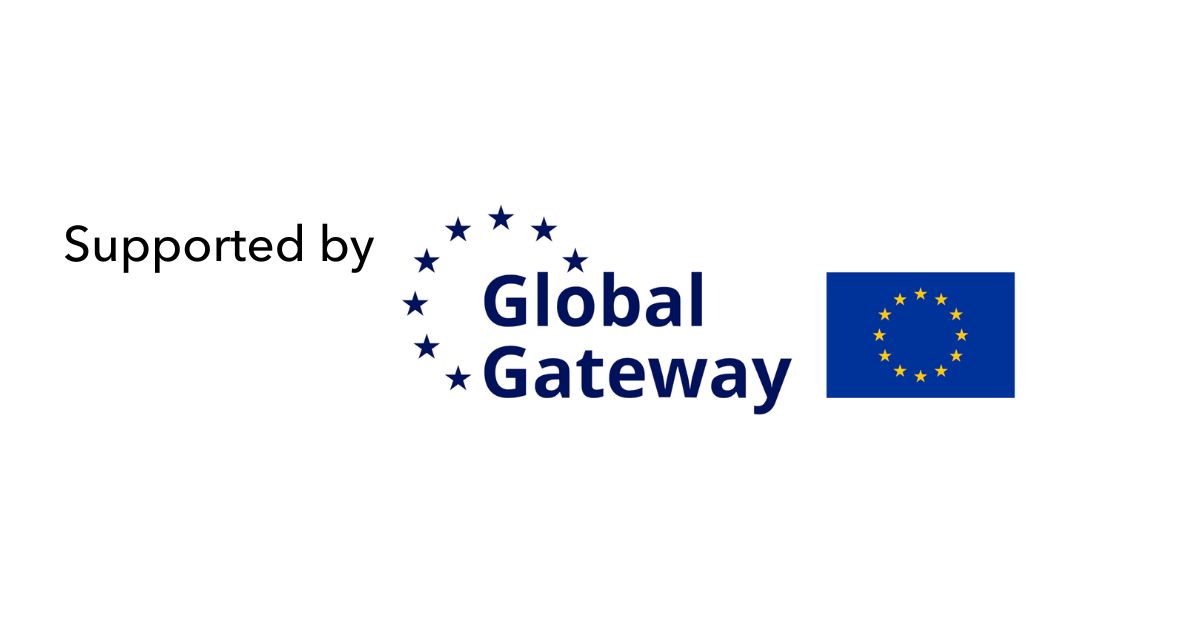- João Roberto Oliveira Jr
- Pedro Lopes
- Daniel Nunes
- Ghazi Mabrouk
- Rosimara Beatriz Arci Salgado
- ICC Educação Continuada
Introductory


Description
This course provides a comprehensive overview of 5G technology, its global regulation and applications. Participants will learn about the evolution and key components of 5G, its applications in sectors such as healthcare and transportation, and the regulatory landscape in different regions. The course also covers security and privacy issues, as well as the economic and social impacts of 5G. Case studies will be presented and best practices for effective 5G deployment will be discussed, preparing participants to influence the development of this technology.
With the generous support of the Global Gateway initiative of the European Union, this course is offered for free for selected participants.
This course is designed to enhance the capacity of government officials, policymakers engaged in digital transformation efforts worldwide.
Members of the above-mentioned target population are invited to apply for the training if they meet the following criteria:
- Have basic knowledge of ICT and/or technology-related issues and the ability to understand the course topics.
- Possess a fluent level of English.
- Complete the application questionnaire and attach an up-to-date CV
Government officials and policymakers from developing countries, particularly women, are encouraged to apply.
Selection will be conducted by the course organizers, who will consider the above entry requirements along with an analysis of the applications.
The number of available places is limited to 30 in this course.
Upon completion of this course, participants will be able to:
- Explain the evolution, architecture, and components of 5G technology;
- Highlight its key features and differences from previous generations of mobile networks;
- Identify and analyze various applications of 5G in critical sectors such as healthcare, transportation, and agriculture, assessing their economic, social, and technological impacts;
- Differentiate the strategies for implementing effective public policies and the challenges related to security and privacy in mobile network infrastructure;
- Illustrate the regulatory landscape of 5G across different regions of the world, covering spectrum policies, licensing, and the role of regulatory agencies in managing and implementing the technology;
- Assess the challenges and best practices in 5G deployment, explore successful case studies
- Review innovative business models that can drive 5G adoption;
- Evaluate best practices to overcome barriers and promote effective use of technology in various markets.
To achieve the training objectives described, the course content will be delivered using the online instructor-led methodology, allowing the participants to access the course from anywhere, offering flexibility and convenience. Live sessions will be conducted through the Zoom platform, facilitating direct interaction between instructors and participants, as well as among the participants themselves. This approach promotes real-time discussions, group work, and instant feedback, maintaining a dynamic and interactive learning environment.
Participants will be divided into two groups. The first group will be invited to attend a series of live lectures organized throughout the first week of the training as per the below schedule:
- Lecture one: 30 September 2024 from 13:30 to 16:30 (CET)
- Lecture two: 01 October 2024 from 13:30 to 16:30 (CET)
- Lecture three: 02 October 2024 from 13:30 to 16:30 (CET)
- Lecture four: 03 October 2024 from 13:30 to 16:30 (CET)
- Lecture five: 04 October 2024 from 13:30 to 17:30 (CET)
The second group of applicants will be invited to attend a series of live lectures organized throughout the second week of the training as per the below schedule:
- Lecture one: 07 October 2024 from 13:30 to 16:30 (CET)
- Lecture two: 08 October 2024 from 13:30 to 16:30 (CET)
- Lecture three: 09 October 2024 from 13:30 to 16:30 (CET)
- Lecture four: 10 October 2024 from 13:30 to 16:30 (CET)
- Lecture five: 11 October 2024 from 13:30 to 17:30 (CET)
The assessment and grading methodology includes a final multiple-choice quiz. The final test will contain 20 questions to provide a more comprehensive assessment. The questions are evenly distributed across the four module topics, with 5 questions dedicated to each topic, ensuring thorough coverage. A total score of 80% or higher is required to obtain the ITU certificate.
Module 1: Fundamentals and Architecture of 5G
Topics covered
- Evolution of Mobile Technologies
- Characteristics of 5G
- 5G Network Architecture
- Practical Applications of 5G
Learning outcomes
- Examine the history and development of mobile networks leading up to 5G.
- Outline key technical features and advantages of 5G (high speed, low latency, greater capacity). Comparison between 5G, 4G, and earlier technologies.
- Detail key elements of spectrum usage.
- Explore 5G enablers and facilitators (Network slicing, Massive MIMO and beamforming, mmWave, Cloudification, and others).
- Analyze 5G network architecture and interfaces.
- Use cases in healthcare, logistics, agriculture, and industry.
Module 2: Global Regulation and Spectrum Policies
Topics covered
- Global Regulatory Landscape
- Spectrum Policies
- Case Studies
Learning outcomes
- List key regulations in regions such as the Americas, Europe, and Asia.
- Describe international standards and guidelines.
- Summarize roles of regulatory agencies.
- Allocation and management of spectrum for 5G.
- Recognize licensing processes and spectrum auctions.
- Outline challenges in spectrum management.
- Analyze successful examples of regulation and spectrum management.
- Discuss international best practices.
Module 3: Security, Privacy, and Social Impacts of 5G
Topics covered
- Security in 5G Networks
- Data Privacy
- Social and Economic Impacts
- Case Studies
Learning outcomes
- Recognize key threats and security challenges.
- Outline security measures and mitigation strategies.
- Recall regulations on data protection in 5G networks.
- Discuss privacy policies and practices.
- Elaborate on the effects of 5G on the digital economy.
- Define core concepts pertaining to digital inclusion and accessibility.
- Describe public policies and the role of 5G in sustainable development.
- Provide examples of positive social impacts and challenges faced by different communities.
Module 4: Business Models and Best Practices for 5G Implementation
Topics covered
- Challenges and Opportunities
- Business Models
- Best Practices
- Debates and Reflections
Learning outcomes
- Capture opportunities for innovation and investment.
- Analyze innovative and sustainable business models for 5G.
- List examples of monetization and market strategies.
- Discuss best practices for effective 5G adoption.
- Examine technical, economic, and regulatory barriers in 5G deployment.
- Explore case studies of success in different global markets.
- Discuss the role of government and public policies in facilitating 5G.
- Reflect on future trends and the long-term impact of 5G technology.